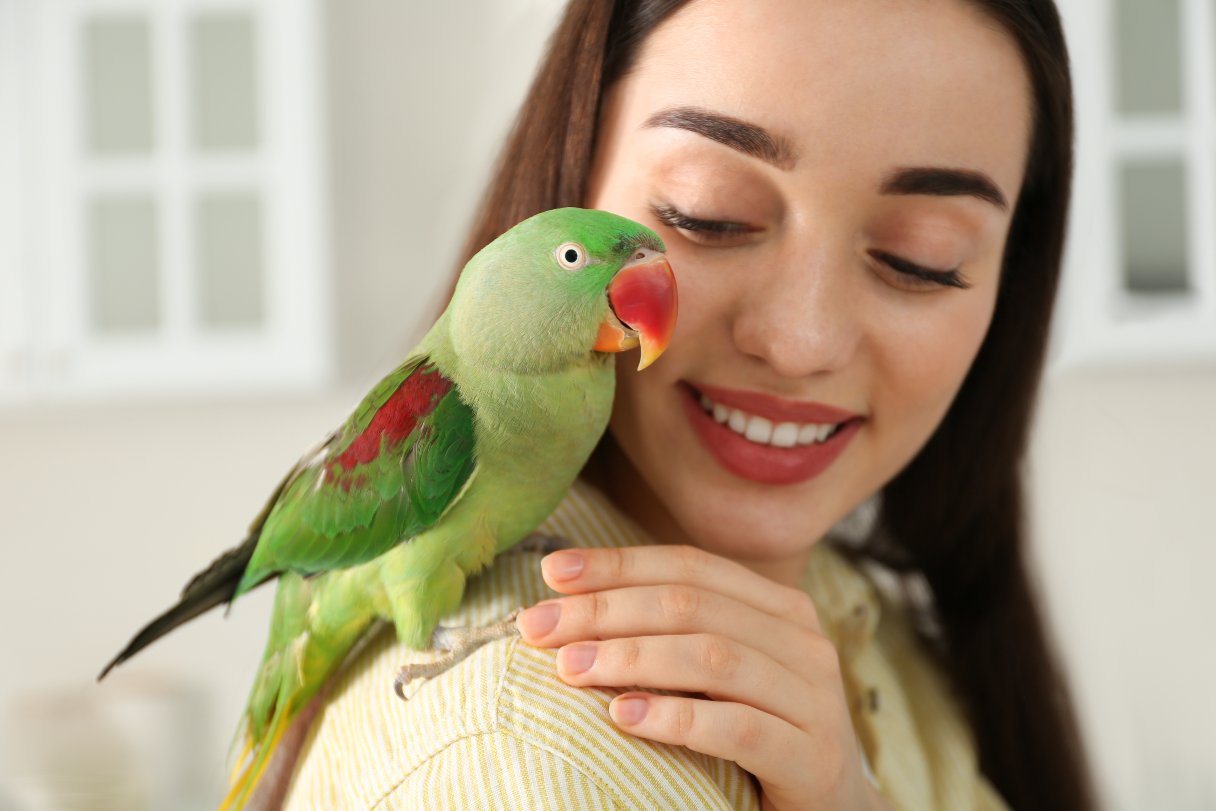Sharing your home with a pet bird can be incredibly rewarding — they’re intelligent, colorful and full of personality. Whether you're drawn to the chirps of a parakeet, the coos of a dove or the lifelong bond of an African grey, there’s a bird for every type of future bird owner and lifestyle. But choosing the right feathered friend is about finding a companion whose temperament, needs and energy levels align with your daily routine.
Why Pet Birds Make Great Companions
As of 2024, 2.1 million households, or 1.6% of households in the United States, own a bird as a pet.1 They may not be as popular as fish, dogs or cats, but pet birds are unlike any other companion animal, packing tons of charm and character in a small, feathered frame.
Many species can be trained to interact, perform tricks or even mimic human speech. Their vibrant plumage and playful behaviors add beauty and fun to any household, making them a joy to watch and engage with daily.
Compared to dogs or cats, birds often require less space and can be easier to care for once you understand their basic needs. While they thrive on social interaction, especially with their humans, birds don’t need to be walked or groomed (in the traditional sense, at least). For those living in apartments or with busy lifestyles, birds can offer a fulfilling pet experience.2
Whether chirping along to your morning routine or perching nearby during a quiet evening, birds can bring warmth, companionship and connection into the home. With the right care and attention, you can form deep bonds that last for many years.
Popular Types of Pet Birds: Pros and Cons
Although birds can make great pets, not all do. It starts with where you get your bird from: breeder, rescue or pet store. Always do your research to ensure that the source is reputable and that the birds are healthy and well-socialized.2
1. Parakeet
-
Pros: Loving and friendly, very social, smart, small3
-
Cons: Full of energy, constantly chatting, needs daily attention, needs time out of their cage daily, loves to chew (parrots can be destructive, especially when they're bored or stressed)4
-
Suitable for: First-time bird owners
-
Life expectancy: 7 to 15 years2
Parakeets are one of the most popular pet birds around the world. Also known as budgies, they typically come in three color combinations: green and yellow, blue and white or a mixture of the two. These lively little birds are cheerful, smart and quite chatty.3
They’re a member of the parrot family and have the largest documented vocabulary of any parrot species. Even if you don’t teach your budgie to talk, these friendly avians are happy to let you know how they feel by singing, whistling, chirping, squawking and squeaking.3
Unlike other types of pet birds, parakeets can be trained to respond to their name, explore tunnels and mazes, play with toys and solve puzzles. The secret to teaching these kinds of tricks is investing the time to build a strong bond with your budgie. Parakeets are clever by nature, but they pick up new skills much more quickly when they feel safe with and connected to their human companion.3
2. Cockatiel
-
Pros: Fun and playful, calm and gentle, on the smaller side, isn't as loud as other birds, often likes to cuddle, easy to train2
-
Cons: Long-term commitment, can still be noisy and dusty, can trigger allergies, needs a lot of attention, likes to chew and can be destructive (especially when they're bored or stressed)4
-
Suitable for: First-time bird owners
-
Life expectancy: 15 to 20+ years2
Cockatiels are affectionate, expressive birds known for their emotional nature and the crest on their head, which signals their mood. Their coloring is mostly gray, with a yellow and white head with orange spots on the outside of their eyes. Males have yellow heads, and females are almost completely gray.2
Males tend to be more playful and are more likely to repeat after their owner; females are among the most gentle of pet birds. These parrots thrive on interaction, need spacious cages and do best in pairs or with plenty of daily attention from humans to prevent loneliness.2
While not all learn to talk, cockatiels are excellent mimics of everyday sounds. One of the most endearing things about cockatiels is their signature whistle — if they whistle at you, take it as a compliment! These charming birds tend to whistle at things (including people) they like.2
3. Lovebird
-
Pros: Social and affectionate, playful and intelligent, small2
-
Cons: Needs enrichment, may test boundaries, can become nippy or aggressive, long-term commitment2
-
Suitable for: Owners with some experience; not suited for homes with young children2
-
Life expectancy: 20+ years2
The smallest member of the parrot family, lovebirds still have a big personality. They bring a splash of color to your home with a mostly green body, orange upper chest and head, blue lower back and rump, red beak and white rings around their eyes.2
The avian is named after the bond they form with their mates and owners, but they don’t have to live in pairs to be happy. In fact, a solo bird is more likely to have a stronger bond with their human.2
4. African grey parrot
-
Pros: Very smart, extremely in-tune with emotions, forms deep bonds, loving2
-
Cons: Very long-term commitment, high need for daily stimulation2
-
Suitable for: Experienced bird owners with time to devote to their bird2
-
Life expectancy: 30+ years2
African grey parrots are highly intelligent and emotionally perceptive birds best suited for experienced owners. They come in varying shades of gray with distinct red tail feathers.2
Known for their impressive vocabulary and ability to mimic speech in context, they require around five hours of daily mental stimulation to stay happy and healthy. While they respond well to positive reinforcement training, their complex needs make them best suited for veteran bird owners. If you're ready to invest the time and care, African greys can become deeply bonded, lifelong companions.2
5. Green-cheeked conure
-
Pros: Playful and highly social, quieter than a lot of other birds, easy to care for2
-
Cons: Very long-term commitment, requires daily socialization, can be mischievous and sassy5
-
Suitable for: Novice bird owners
-
Life expectancy: 20 to 35 years5
Green-cheeked conures are a popular choice for first-time bird owners thanks to their small size and inquisitive, friendly nature.5 The birds are mostly green with a gray head and chest, blue on the tips of their wings and a maroon tail.2
These playful, social avians love interacting with their humans and are known for their mischievous charm. While they rarely learn to talk, green-cheeked conures make up for it with affection and personality.2
6. Canary
-
Pros: Beautiful, good-natured, low-maintenance
-
Cons: Frightens easily, fragile, shy and doesn't like to be handled (which could be a pro depending on what you’re looking for in your bird), requires a large cage2
-
Suitable for: First-time bird owners who don’t have a lot of time to socialize; prefer quiet environments, as they can be easily frightened2
-
Life expectancy: 9 to 10 years2
These bright, lovely birds have been known for their vibrant colors — yellow, green or orange — and remarkable singing ability for centuries. With more than 200 unique breeds, canaries vary widely in appearance and personality.2
Unlike more interactive birds, they are quite shy and prefer not to be handled, so patience is key when building trust. Only male canaries sing, while females offer a quieter presence.2
7. Dove
-
Pros: Gentle and calm, interactive, quiet, low maintenance6
-
Cons: Requires a large cage, should be kept in pairs6
-
Suitable for: First-time bird owners who don’t have a lot of time to work on socialization; older children; not well-suited for noisy households6
-
Life expectancy: 8 to 15 years2
Doves are another gentle, low-maintenance bird and make excellent pets for people with busy schedules, specifically ring-neck doves, diamond doves and collared doves.6 Most of the time, their coloring is just what you’d think of when you hear the word “dove”: brown and dull gray feathers, black eyes and black beak with a ring or collar around their necks.2
While they enjoy companionship, doves aren’t overly demanding and are content with occasional interaction and gentle handling.2 That being said, these birds are happiest and healthiest when kept in pairs.6 Their calm nature and soothing coos make them especially well-suited for first-time bird owners and older children.2 Since doves fly (rather than climb like parrots), they need a spacious cage with plenty of room to move between perches.2
Choosing the Best Pet Bird for You
Whether you’re looking for a quiet, low-maintenance companion or a chatty, intelligent pet to bond with, choosing the right bird comes down to understanding your lifestyle and what kind of relationship you hope to build. With proper care, attention and a little research, your feathered friend can bring years of joy and beauty into your life.
CareCredit Credit Card Financing for Birds
The CareCredit credit card provides a convenient way to pay for your bird’s health and wellness expenses, including exams, medications and products at providers in the CareCredit network.* Continue your wellness journey by downloading the CareCredit Mobile App. You can find a provider on the go, manage your CareCredit account and easily access the Well U blog for more great articles, podcasts and videos. Use our Acceptance Locator to find a veterinarian that accepts CareCredit to help keep your pet healthy and happy for a lifetime of love.
In addition to pet care, you can also use your CareCredit credit card for dentistry, cosmetic, vision, hearing, health systems, dermatology, pharmacy purchases, spa treatments and so much more within the CareCredit network. How will you invest in your health and wellness next?
Author Bio
Abbie Mood is a freelance writer with more than 15 years of experience. She has worked with clients of all sizes to create compelling content and she has written for the American Kennel Club, Marriott Bonvoy, Women’s Health Online, Headspace and more.








